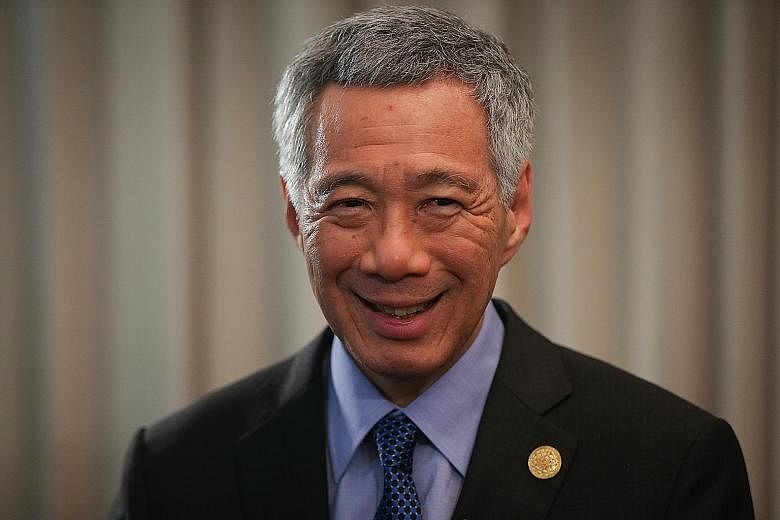Prime Minister Lee Hsien Loong yesterday called on countries in the Asia-Pacific Economic Cooperation (Apec) to open up their service industry to further integrate their economies.
While such a move is not easy, PM Lee suggested the countries start by focusing on sectors that will smoothen trade flow, such as telecommunications and logistics.
He cited two instances when making his call at a session of the Apec Leaders' Meeting on the integration of economies.
One is that improving supply chains through swifter air transport will benefit the perishable goods business.
The other is that easing services that can be done digitally, such as financial, insurance, legal and accounting services, will let businesses operate more easily.
But such changes do not mean removing altogether a country's domestic regulation, said Mr Lee. It is still necessary to set rules according to each nation's priorities.
He said: "We are talking about efficiency, transparency and consistency in implementing regulations, and not allowing regulations to become a non-transparent opaque way of cooperation."
He praised the Philippines, the meeting's host, for developing the Apec Services Cooperation Framework that will establish a road map for a comprehensive liberalising of the service industry.
United States President Barack Obama and South Korean President Park Geun Hye made similar calls for freeing up the service sector. Services account for more than half of Apec's total gross domestic product of US$45 trillion (S$64 trillion).
Later, Mr Lee, at a press conference with the Singapore media, said the issue is complex as it involves concerns such as foreign labour influx, standards and rules recognising qualifications.
The leaders, as a result, did not go into details but talked about it in principle. But he added: "If you're talking about integrating economies, you must find a way to move services into the framework."
It will bring new markets and big opportunities for Singapore as services, ranging from transport to banking, make up about 80 per cent of its economy.
Mr Lee, in his speech at the Leaders' Meeting, also noted that 2015 is a "milestone year for regional economic integration".
Among the achievements are the Australia-Japan Free Trade Agreement that came into force and the recently concluded Trans-Pacific Partnership (TPP) trade pact with members such as the US, Japan and Singapore.
Over this weekend, Asean leaders meeting in Kuala Lumpur will sign the declaration for an Asean Community to further boost economic cooperation.
"I hope we can keep up the momentum because they are pathways to realising an eventual Free Trade Area of the Asia-Pacific (FTAAP), which will give Apec substance, purpose and also benefit our countries," he said.
But there are multiple routes to realising the FTAAP, said Mr Lee.
They include the Regional Comprehensive Economic Partnership (RCEP), which involves 16 countries - all 10 Asean members plus China, Japan, South Korea, India, Australia and New Zealand.
The RCEP has not fully fulfilled its potential, said Mr Lee.
"We should double our efforts to level the RCEP up to other pathways like the TPP, both in pace and in substance, so that we can achieve truly regional economic integration," he added.

